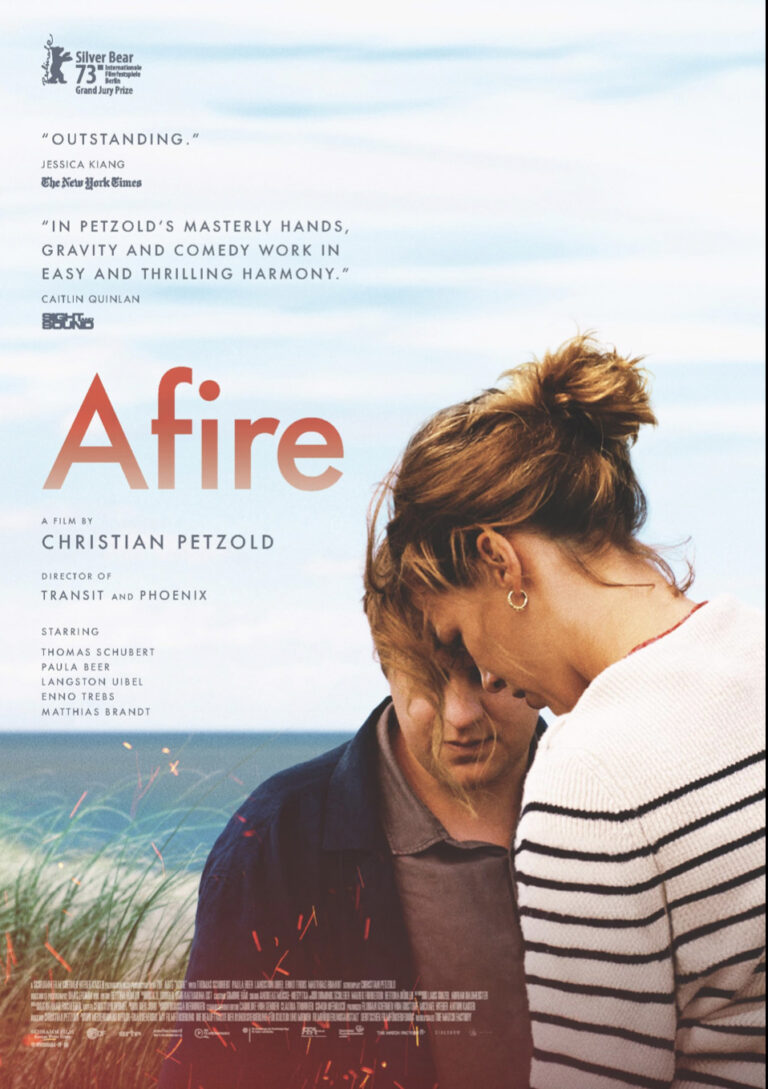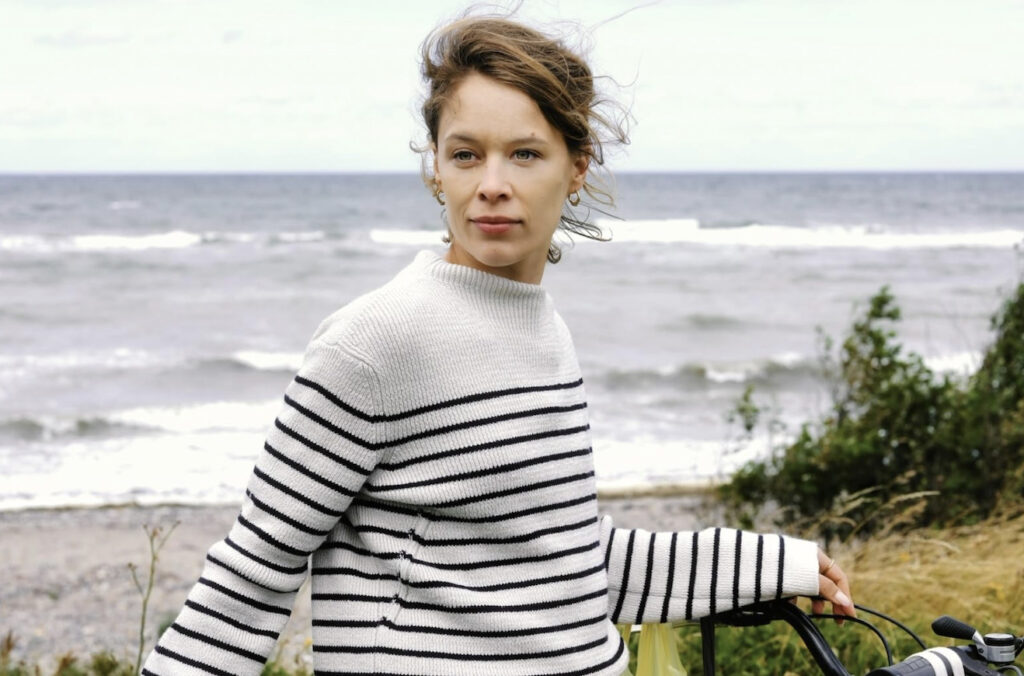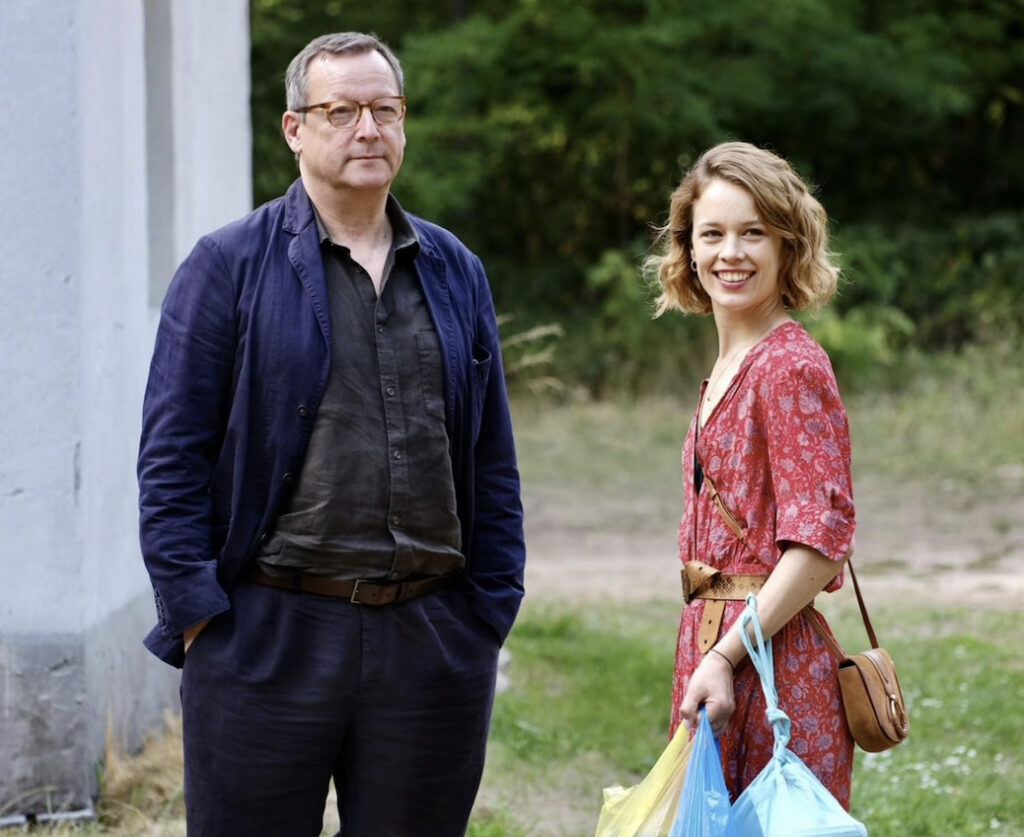
Embracing emotional growth after enduring a harrowing crisis in a seemingly tranquil setting is one one of the most fulfilling arcs for characters who don’t initially view themselves to be as provocative as those closest to them. That’s certainly the case for actor Thomas Schubert’s character of writer Leon in the new ensemble romantic dramedy, Afire.
The author initially embraces his somewhat pretentious nature as he chases his next literary success. However, along the way he also embarks on a journey of self-reflection when he witnesses how his aloof behavior is alienating him from the very relationships he longs for, for both his characters and himself.
The movie, which is in German with English subtitles, was written and directed by German auteur, Christian Petzold. Afire marks the third collaboration between the filmmaker and his muse, actress Paula Beer, after they worked together on the 2018 sci-fi drama, Transit, and the 2020 fantasy drama, Undine.

Afire follows Leon and his friend, photographer Felix (Langston Uibel), as they embark on a seaside vacation together to work on their latest respective projects in isolation. But the trip takes an unexpected turn when they arrive at Felix’s family’s cottage by the Baltic Sea; they discover that Nadja (Beer), the niece of one of Felix’s mother’s co-workers, is already staying there.
But to Leon’s dismay, Felix agrees to allow Nadja, who works as a seasonal food worker at the nearby beach, to stay with them. Leon is initially upset by many of her actions, including the fact that she plays music late at night and invites her new romantic interest, Devid (Enno Trebs), to join them on frequent occasions. However, as the days pass, Leon’s feelings begin to change, as he finds himself become more intrigued by Nadja.
However, the group’s well-being becomes threatened by the dry summer heat. The rising temperature leads to an ever encroaching fire in the forest surrounding the cottage, which slowly puts all of their relationships into perspective.
Afire is an intriguing, thought-provoking departure from Petzold’s earlier films, including Transit and Undine. His latest project intriguingly forgoes the themes of his most recent movies, which thrive on textural elements of political, economical, historical or social context, to instead serve as a more relatable romantic character study.
Through the literal and metaphoric introduction of the earthly elements, particularly water and fire, Afire intriguingly represents how flourishing romantic connections influence all aspects of life, including friendships and creative work. Notably moving away from presenting the three male characters – Leon, Nadja and Felix – through the gaze of toxic masculinity that has become far to common in dramas in recent years, Petzold’s latest feature is a stellar character study of the ongoing insecurities of fragile masculinity.
The dramedy begins as an intriguing, equally balanced portrait of the close friendship between Leon and Felix, before their distinct personalities and views on life quickly begin to shine through and effect their time at the beach house. As the story in Afire begins to unfold, its perspective becomes more heavily reliant on the author’s internal struggles and conflicts.

Chronicling Leon’s desperate attempt to continue working on the follow-up to his successful debut novel, Petzold’s script powerfully captures the character’s fear of not continuing his early success leaves him. Also watching Felix grow closer with Nadja and Devid leaves Leon feeling unnerved and unsettled, despite his indifference to the simple pleasures of summer they embark on.
Schubert gives a stellar performance as the equally self-indulgent and vulnerable Leon. The actor often presents his character as being abrasive towards the reset of the group when they dismiss his dedication to, and insecurities about, his work. While Leon is presented as abrasive and insensitive to the rest of the group, especially Nadja, at times, he doesn’t turn to contemptible behavior towards them, however, as he does care about them in his own ways.
Leon’s self-serving mentality and frustration over the new dynamic he feels with Felix and their new friends is also driven by a sense of melancholy. He wishes to be as freely accepted by Nadja and Devid as Felix is as their stay continues. But the isolation he imposed on himself when they first arrived prevents him from feeling comfortable enough to connect with them and see what’s truly going on around him.
The author wishes to be the center of the group’s attention, but only on his terms, for the majority of the story. However, his perspectives on the group’s relationships, and his overall demeanor on life, does change after they have a chance encounter with the growing forest fire near the cottage.
Nadja is another stand-out character in the film, as Petzold’s development in the script presents her as being the total opposite of Leon. Beer truly embraces her character’s sense of being fully self-possessed and not needing the men in her life to define her self-worth or identity through her personal connections and career successes.
Instead of also being jealous of other people’s successes, like Leon is, she just focus on what currently makes her happy and her potential.

While Afire isn’t as politically, economically, historically or socially driven as his previous features, the story in Petzold’s new immersive character study is just as beautifully chronicled on screen. Through the striking visual storytelling style of its cinematographer, Hans Fromm, who also collaborated with the helmer on Transit and Undine, their new movie feels both remarkably grounded and subtly delirious.
The cinematographer visually infused commentary on climate change in Afire through a dreamlike red haze that illuminates the background of the forest sky near the cottage. That inclusion in the dramady, whose recent screenings at the Tribeca Festival were ironically held a week after New York was covered in thick orange smoke from the Canadian wildfires, also reflects the potential of Leon’s relationships to thrive in the future if he puts the work into to changing his situation.
Afire is a contemporary, romantic and relationship-driven character story that builds on Petzold’s strong collaborations with his new and returning actors and fellow crew members. Forgoing the strong political, economic, historical and societal studies that he focused on in Transit and Undine, the filmmaker’s latest feature thrives on his newfound dedication to the transformational force of love.
The actors emottionally fuel their characters’ differences and the sense of community they rely on together to counteract isolation and despair throughout the movie. Schubert’s raw portrayal of Leon’s self-imposed work exile, which only ends up fueling his frustration of not being accepted by his peers, and Beer’s commanding performances as the self-possessed Nadja, is the true driving force behind Afire.
Being relevant in its timeless approache to romance and regret and commentary on modern climate change in its supporting story, Petzold’s latest film is a smart, vulnerable examination into the insecurities of the fragile male artist that shouldn’t be missed.
Grade: A-
Afire had its New York Premiere on June 17 in the Spotlight Narrative section at the 2023 Tribeca Festival.

